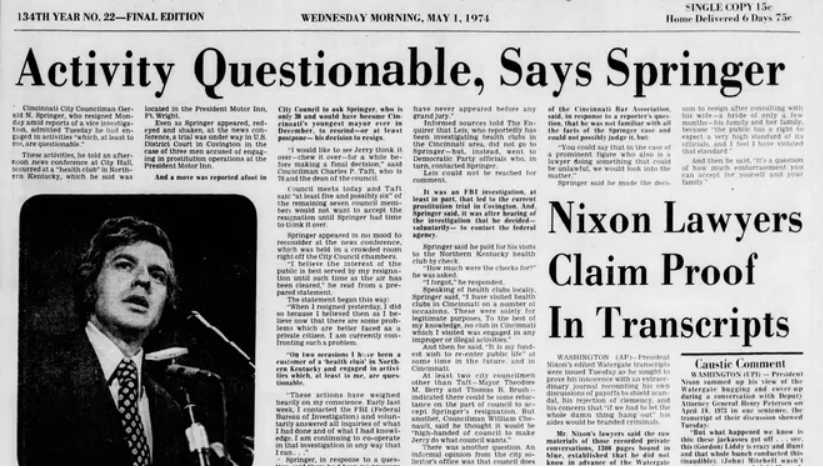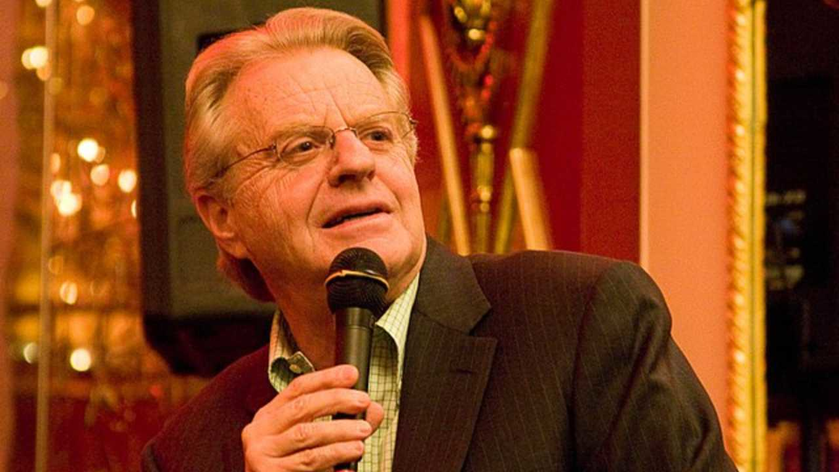For 27 years, Jerry Springer hosted, The Jerry Springer Show, and if you found yourself sitting on his stage, chances were that your life was definitely not in a good place. And if you believed that all was right in your world, by the end of the one-hour show, you were probably going to find yourself later that night neck deep in dollar margaritas crying to the person on your left about how you were unknowingly sleeping with your cousin, and the child you thought was yours was actually your next-door neighbors.
You may also be nursing a goose egg on the back of your head after your next-door neighbor took his chair and swung it at your head before the iconic security guards broke up the fight.
Watching the Jerry Springer Show was a great way to remind yourself that no matter how bad your life was going at the moment, there was someone out there having a worse day than you.
But alas... all good things must come to an end and on April 27th, the great Jerry Springer went to that big talk show in the sky.
TMZ reports that a family spokesperson says Jerry was battling a "brief illness." TMZ added that "Sources tell us it was pancreatic cancer that was diagnosed a few months ago, and this week he took a turn for the worse."
The spokesperson says he died Thursday morning, peacefully at his home in the Chicago area.
But who was Jerry Springer and how did he end up as an iconic daytime television name? His story begins not in America, and at one time his claim to fame was on a completely different trajectory than hosting the "raucous and wild show -- which was known for its outrageous guests who usually got into crazy fights as the audience cheered, "Jerry, Jerry, Jerry, Jerry!"
The Springer show initially centered on political issues, but the program struggled in its first few seasons.
By the mid-1990s the show was known for its controversial topics, such as incest and adultery, physical fights, profanity, and scantily clad guests. The Jerry Springer Show was condemned by many political and community leaders as “trash TV,” and there were allegations that parts of the program were staged.
Despite the claims, the show remained popular with television viewers. The show even inspired an opera, which debuted in London in 2003; Springer was not part of the cast.
The acclaimed production, which won a Laurence Olivier Award for best new musical, was subsequently staged in various U.S. cities.
In 2018 The Jerry Springer Show was canceled, and production was halted. However, it was announced that the TV show would move to the CW channel, where some previously unseen episodes were expected to air. In 2019 Judge Jerry debuted, with Springer presiding over legal disputes. The show ended in 2022.
Springer was much more than he was portrayed on his show. He was born February 13, 1944, in London, England. Springer’s family immigrated to the United States when he was five years old, taking up residence in New York City.
In 1965 he graduated from Tulane University with a political science degree, and three years later he earned a law degree from the Northwestern University School of Law in Chicago.
Yes, you read that right. Springer had a Law Degree and a Political Science degree.
Following graduation, he worked on the presidential campaign of Robert F. Kennedy. Kennedy was the U.S. attorney general and adviser during the administration of his brother Pres. John F. Kennedy (1961–63) and later a U.S. senator (1965–68). He was assassinated while campaigning for the Democratic Party’s presidential nomination in 1968.
In the early 1970s Springer embarked on his own political career in Ohio, serving on Cincinnati’s city council. In 1974 he was forced to resign from the council over a controversy involving prostitution, but he regained his seat at the next election.
The "controversy" could have been a headline for one of his shows.
April 29, a popular political columnist Frank Weikel reported on The Enquirer's front page that a "Cincinnati politico" was involved in a two-state VICE probe. Springer went unnamed, but prostitution was mentioned.
Later that day, "in an abrupt move that shook Cincinnati's political community," Springer resigned.
The next day he held a news conference alluding to the prostitution investigation at a health club in Fort Wright.
"When I resigned yesterday, I did so because I believed then as I believe now that there are some problems which are better faced as a private citizen," Springer said.

But still, the story as to what actually happened did not surface until Springer voluntarily testified in a Kentucky courtroom.
He said his conscience drove him to contact the FBI after he paid for prostitutes with two personal checks in December 1973 and January 1974.
In 1975, Springer made one of the biggest political comebacks in Cincinnati history winning back his seat on the council. His sincere and direct television ads directly addressing the issue were credited for the win. Springer was open about paying for a prostitute with a check and at times, his appearance seemed to be a PSA for others not to use a check to pay for illegal activities.
Although a liberal in relatively conservative Cincinnati, he was elected mayor of the city in 1977. In 1982 he made a failed bid for the Democratic nomination for governor of Ohio. Afterward, he turned to television journalism.
However, Springer remained interested in politics, regularly appearing on television programs to espouse his liberal philosophy. He considered a return to the political arena in 2004 to run for the U.S. Senate.
In 2017, Bussiness Insider reported that "Influential Ohio Democrats are pushing former Cincinnati mayor and daytime-TV host Jerry Springer to run for Ohio governor in 2018, more than half a dozen Democrats familiar with the race told Business Insider."
According to Insiders reporting, Springer's proponents highlighted his ability in the era of President Donald Trump to provide his own funding for a campaign and to connect with working-class voters familiar with his television show and history in Ohio politics.
Those that discussed a possible Springer candidacy for Governor at the time included Ted Strickland, the former Ohio governor.
Strickland told Business Insider that Springer "certainly would start out with wide name recognition."
"I think he has a very strong ability to communicate what I think is the heart of the Democratic message," Strickland said, pointing to speeches Springer delivered to delegations at the Democratic National Convention in Philadelphia.
In fact, Springer continued to circle around the political arena, including making appearances at party events. Giving peaches and drawing a crowd at fundraising events.
Springer was also named in 2017 as the 2nd District in Ohio's largest donor annually.
"The issue of me running for political office frequently comes up because I am constantly touring around, giving speeches, and raising money for the party," Springer said in a statement. "Truthfully, I've been doing that for at least the last 30 years as a private citizen because I believe joining the conversation is part of being a good citizen. If I do ever decide to throw my hat in the ring...I will let people know. At this point...I don't even have a hat."


















